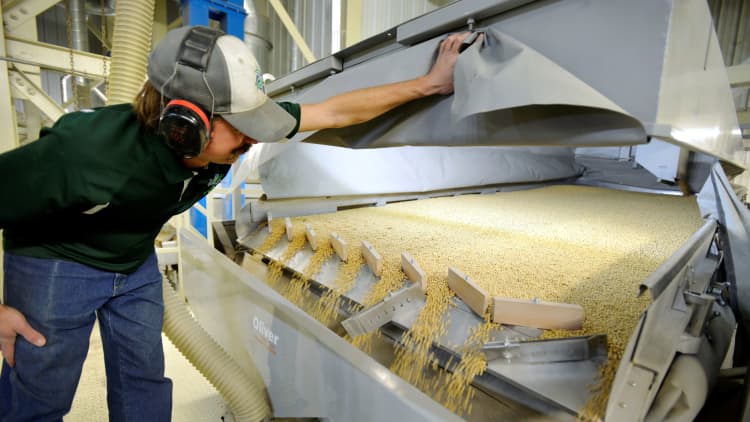
President Donald Trump's $12 billion emergency aid plan designed to help farmers hit by retaliatory tariffs is seen as "unprecedented" and could have unintended consequences and potentially run afoul of World Trade Organization rules.
Some of the aid would come through a U.S. agency with authority that dates back to the Great Depression, but that authority has been used "fairly rarely" and on programs "in the millions of dollars," not billions, according to a former chief economist at the U.S. Department of Agriculture. The plan disclosed Tuesday by the Trump administration doesn't require congressional approval.
"This is unprecedented in terms of overall amounts," said Joseph Glauber, a former USDA chief economist and now a senior research fellow at the International Food Policy Research Institute in Washington. "We've had ad hoc assistance packages where farmers received $6 billion or so in additional funds and some disaster relief. But this is a big number — and I was surprised by the level of it."

Glauber, who served about 30 years in the federal government in various roles as an economist and as a U.S. chief agricultural negotiator for trade talks, said he had originally expected the emergency aid plan, when there was talk of it floated, to be "a few billion dollars."
According to the statement from the USDA, the administration "will take several actions to assist farmers in response to trade damage from unjustified retaliation." The plan authorizes the agency to spend "up to $12 billion in programs, which is in line with the estimated $11 billion impact of the unjustified retaliatory tariffs on U.S. agricultural goods. These programs will assist agricultural producers to meet the costs of disrupted markets."
'Don't want bailouts'
"Our farmers, our producers, they don’t want bailouts," Simon Wilson, executive director of the North Dakota Trade Office, told CNBC's "Closing Bell" on Tuesday. "They don’t want this help in the short term. They want long-term stability.”
Wilson added, "A lot of people have been hurt, so that’s a lot of money that’s going to have to be shared.”
Payments under the largest part of the federal government's relief plan would be targeted to producers of soybeans, sorghum, corn, wheat, cotton, dairy and hogs.
Some experts have warned in the past that government aid or new subsidies could distort or disrupt markets and ultimately have negative consequences for the agriculture industry. That also includes the possibility it could lead to more retaliation on other agricultural exports.
In any event, Glauber said the program is likely to be taken as "producer support" and appears to be targeted toward a drop in the market price of certain commodities, meaning it could get counted against the U.S. commitments from the WTO.
"We've run pretty low levels of [producer] support in recent years, but it will certainly raise a lot of eyebrows and will make people look at those calculations very, very carefully," said Glauber. "It also will look at the way we formulate those programs very, very carefully."
Soybean prices alone have plunged nearly 20 percent since April when China first announced the 25 percent tariff on U.S. soybeans. That means farmers are getting lower prices for the commodity, and at these levels some are not making enough to cover bills. Beijing started collecting the tariff on U.S. soybeans on July 6.
Some of the farm sector tariffs are tit-for-tat measures in response to the White House's duties on imported steel and aluminum, while others were imposed by Beijing following other rounds of tariffs. President Trump also is threatening another $500 billion in tariffs against China, which could produce even more retaliation by the world's second-largest economy.
'Right direction'
China also has imposed at least two rounds of tariffs on some U.S. farm products, including pork, nuts and fresh fruit. Beijing hasn't identified soybeans for a second round of tariffs but given the high value of the commodity there's a possibility they could target it too with a second wave of import duties.
"We've all got a little anxiety and a little worry about where things are going in the future," said farmer Steve Fourez, who produces corn and soybeans in Fairmount, Illinois. "What's been proposed, from what I can tell, won't by any means make us farmers whole. It's a step in the right direction to try and make things better for us and help us get through this."
Regardless, there are complex rules covering domestic support within the global trade regulator WTO and measures that are considered to distort production and trade.
Trump previously has been critical of the WTO for its treatment of the U.S. The news website Axios in late June reported that Trump wanted to exit the WTO, but Treasury Secretary Steve Mnuchin later put cold water on that idea.
Depression-era authority
Among the authorities that will be utilized are the Commodity Credit Corp., a federal agency set up during the Great Depression. USDA said a "market facilitation program" under the CCC "will provide payments incrementally to producers of soybeans, sorghum, corn, wheat, cotton, dairy, and hogs. This support will help farmers manage disrupted markets, deal with surplus commodities, and expand and develop new markets at home and abroad."
At the same time, the Trump administration plans to tap federal food purchase and distribution programs, including buying surplus commodities of some farm products such as fruits, nuts, rice, legumes, beef, pork and milk for distribution to food banks and other nutrition programs. There also will be trade assistance provided to the agriculture industry through USDA's Foreign Agriculture Service to help develop new export markets.
The CCC can borrow tens of billions of dollars from the U.S. government to use for its programs and doesn't require new congressional approval to fund the plan outlined by the administration.
The emergency aid program is timed to potentially help Republicans deliver in the upcoming midterm elections. Many of the heartland states that supported Trump in the 2016 presidential election — Iowa, Nebraska, Kansas, Texas, North Dakota and South Dakota — have been impacted by the retaliatory tariffs from China and other countries.
"These are important constituents, and generally farmers have been very, very supportive of this administration," said Glauber. "But most farmers would probably say they would prefer having markets open. By the same token, I'm sure they are very grateful that they are getting some payment on this."


